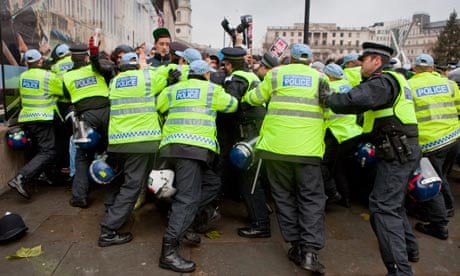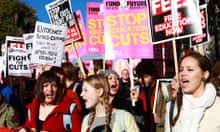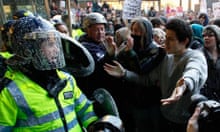Police could be forced to adopt more extreme tactics to counter the threat posed by student protesters and "hacktivists", according to Sir Hugh Orde, the president of the Association of Chief Police Officers.
Speaking before major protests planned across Britain at the weekend, Orde admitted that use of text messages, Twitter and Facebook to organise campaigns in record speed had created "a whole new dimension to public order".
The Metropolitan police faced questions over its handling of violent student protests last December, but Orde defended the use of kettling [see footnote] despite admitting that it could "interfere with the rights of citizens".
"I can understand the need for it," he admitted. "[It is done] for the greater good, and that's the really complex part of policing."
Orde admitted he feared protests could become more violent as public anger grew over government cuts. He claims that the use of horses to charge protesters was, when "proportionate", a "very useful, effective tactic".
On Saturday, student groups in London and Manchester will protest against the abolition of the education maintenance allowance. On Sunday UK Uncut, a group putting pressure on wealthy tax avoiders, will repeat the high street demonstrations that shut Vodafone and Topshop branches in December by targeting other big names, including Boots.
Orde hinted that UK Uncut protesters could face criminal and civil charges if they invaded shops on Sunday.
"Walking into Topshop with an intent to cause damage, [means] you're actually a burglar," he said. " If you walk into Boots and do nothing then you are simply a trespasser and the role of the police is to stand by to prevent a breach of the peace."
Anonymous, the hacker network that came to the defence of WikiLeaks last year, has also pledged more attacks in months to come.
Orde, the head of Acpo, a limited company run by police chiefs, criticised the lack of willingness of new protest groups that have sprung up around the internet to engage with police before protests. He said if they continued to refuse to co-operate, then police tactics would have to become more extreme.
"It is not good enough to throw our hands up in the air and say 'Oh, we can't negotiate because there is no one to negotiate with,'" he told Prospect magazine in an interview published today. "There are lots of people we can talk to, but they need to stand up and lead their people too. If they don't, we must be clear that the people who wish to demonstrate won't engage, communicate or share what they intend to do with us, and so our policing tactics will have to be different ... slightly more extreme."
Referring to December's student protest which exploded into violence, he said that while the vast majority of protestors were exercising their democratic rights, he believed there had been others "embedded in that crowd [who were] absolutely determined to do anything but that and cause as much disorder and mayhem as they could for their own reasons – be they anarchists or not – people who just wanted to cause trouble".
Orde, who was praised when he was in charge of policing divided communities in Northern Ireland, admitted that the police were floundering in their efforts to keep abreast of activities planned over the internet.
The National Union of Students, for example, began planning its march last November, two months before the event, while the second protest was organised in a matter of days, using text messages and Twitter. A Facebook page titled "Day X," attracted 25,000 users in days.
Orde also admitted that the standard of policing across the UK was being jeopardised by the government's refusal to modernise the way the police forces are split across 42 parts of the UK. "There is no desire from this government to review the current police force structure so we are trying to deliver 21st-century policing against a 20th-century policing structure which I would argue is a big mistake," he said.
"[We need] a broad consensus across chiefs around what tactics can be deployed, because I do see mutual aid becoming more important [as] cops are going to have to move around the country," he added. "Otherwise when you borrow cops [from different areas] you do get potentially a far more extreme situation where cops think they are doing the same thing but they are not."
Orde went on to reveal fears that protests would become more violent as the police became the focus of growing public anger at government cuts. "We're seen [as if] we are the physical manifestation of the state … and the moment the people in a crowd think that we are the state enforcing a certain specific law … then I think the propensity to violence may increase," he said.
Orde added that the risks presented by groups such as Anonymous and cyber-criminals were leading to a new brand of policing so sophisticated that it made the current generation "look like complete amateurs".
"Forty-two different police forces spread across the country are not well able to deal with [cyber crime], which is why you have to reorganise," he said.



